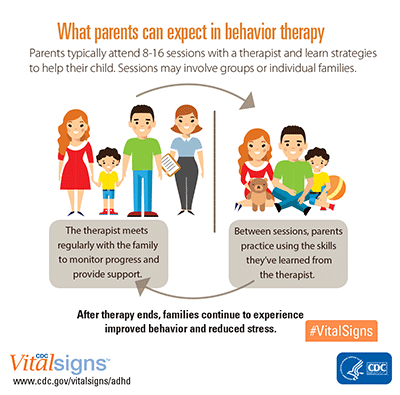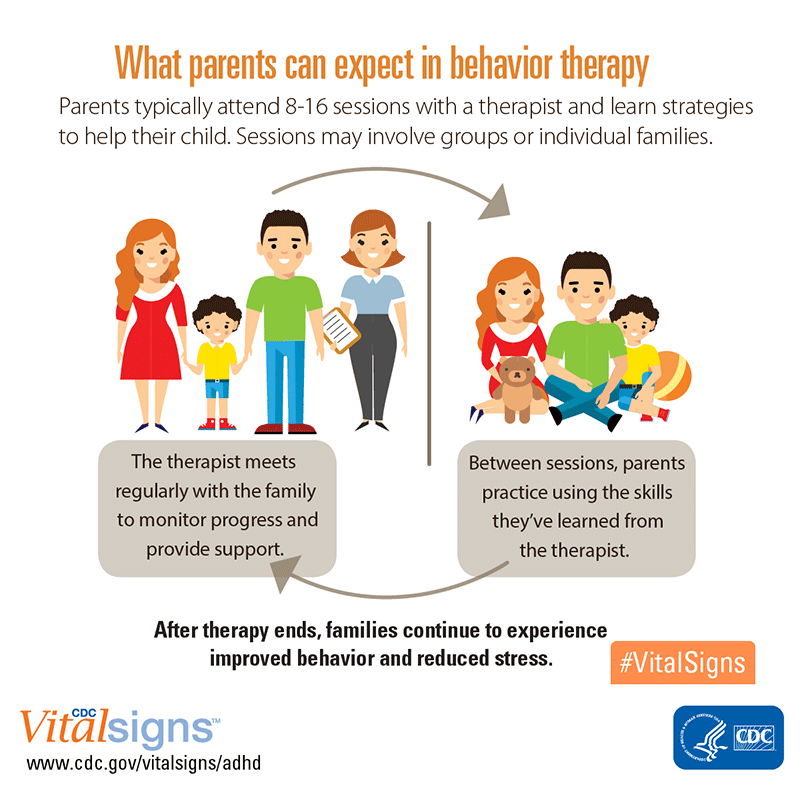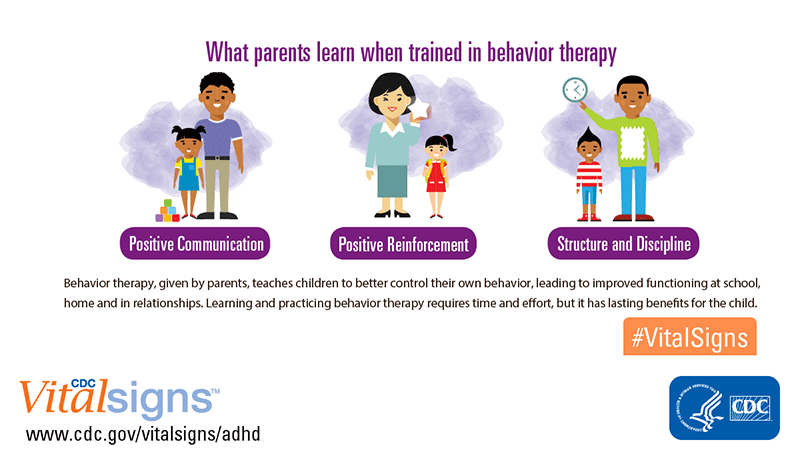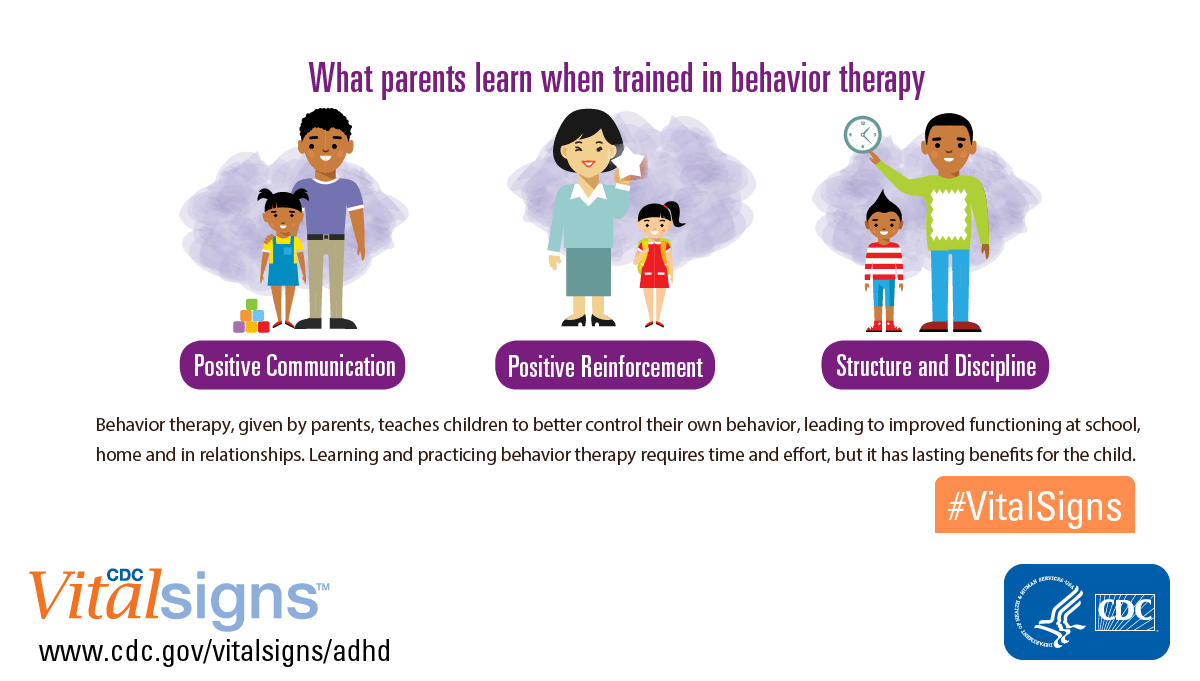Behavior therapy for young children with ADHD
Behavior therapy is effective treatment for attention-deficit/hyperactivity disorder (ADHD) that can improve a child’s behavior, self-control, and self-esteem. It is most effective in young children when it is delivered by parents. Experts recommend that doctors refer parents of children under 6 years old for training in behavior therapy before prescribing ADHD medicine. When parents become trained in behavior therapy, they learn skills and strategies to help their child with ADHD succeed at school, at home, and in relationships.
Behavior therapy, given by parents and with the support of healthcare providers, teaches children to better control their own behavior, leading to improved functioning at school, home and in relationships. Learning and practicing behavior therapy requires time and effort, but it has lasting benefits for the child.
Finding a therapist
How do families find a therapist who trains parents in behavior therapy?
Psychologists, social workers, and licensed counselors can provide this kind of training to parents. Therapists may be found through professional association directories or through health insurance provider directories. Parents can review the therapist’s online profile or call and ask the therapist to describe their approach to ADHD treatment.
Online provider directories:
- American Psychological Association Psychologist Locator,
- American Association of Marriage and Family Therapy Locator
- Find a Cognitive Behavioral Therapist – A search tool by the Association for Behavioral and Cognitive Therapies
- MentalHealth.gov – Treatment locator for mental health services and resources
- American Board of Professional Psychology Locator
- National Association of Social Workers
- Hospital and University Related ADHD Centers
Did you know?
Parent Training in Behavior Therapy is also known as Behavior Management Training for Parents, Parent Behavior Therapy, Behavioral Parent Training, or just Parent Training
What should parents look for?
Families should look for a therapist who focuses on training parents. Some therapists will have training or certification in a program that has been proven to work in young children with ADHD. Such programs include those listed in a 2011 Agency for Healthcare Research and Quality (AHRQ) report:
- Triple P (Positive Parenting Program),
- Incredible Years Parenting Program
- Parent-Child Interaction Therapy
- New Forest Parenting Programme
While these may not be available in all areas, other programs have also been tested and found to work in children with ADHD. The following list of questions can be used to find a therapist who uses a proven approach:
-
Does this therapist
- Teach parents skills and strategies that use positive reinforcement, structure, and consistent discipline to manage their child’s behavior?
- Teach parents positive ways to interact and communicate with their child?
- Assign activities for parents to practice with their child?
- Meet regularly with the family to monitor progress and provide coaching and support?
- Re-evaluate and remain flexible enough to adjust strategies as needed?
What can parents expect?
Parents typically attend eight or more sessions with a therapist. Sessions may involve groups or individual families. The therapist meets regularly with the family to review their progress, provide support, and adjust strategies as needed to ensure improvement. Parents practice with their child between sessions.
What will parents learn?
Parents learn how to:
- Strengthen the relationship with their child through positive communication, for example, active listening and describing emotions
- Reinforce good behavior, for example, giving positive attention and effective praise for good behavior
- Create structure and provide consistent discipline, for example, giving effective instructions, withholding attention for unwanted behavior, and effective use of time-out
Children with ADHD often have many challenging behaviors. A therapist will help parents learn these skills and how to use them effectively with their child.
What if a therapist is trying something different?
Parents have the greatest influence on their young child’s behavior. Only therapy that focuses on training parents is recommended for young children with ADHD because young children are not mature enough to change their own behavior without their parents’ help. Some therapists may use play therapy or talk therapy to treat young children with ADHD. Play therapy provides a way for children to communicate their experiences and feelings through play. Talk therapy uses verbal communication between the child and a therapist to treat mental and emotional disorders. Neither of these has been proven to improve symptoms in young children with ADHD.
Learning and practicing behavior therapy requires time and effort, but it has lasting benefits for the child. Ask your doctor about the benefits of parent training in behavior therapy for young children with ADHD.
Click here for a downloadable version of this information.
Behavior Therapy for Young Children with ADHD: Overview for parents
What can healthcare providers do?
Healthcare providers can:
- Follow the clinical guidelines for diagnosis and treatment of ADHD in young children.
- Discuss with parents the benefits of behavior therapy and why they should consider getting training.
- Identify parent training providers in their area and refer parents of young children with ADHD for training in behavior therapy before prescribing medicine.
For more information:
For Parents and Providers:
- Finding a Therapist: A Guide for Parents
- Behavior Therapy for Young Children with ADHD: Overview for parents
- Behavior Therapy for Younger and Older Children with ADHD: Overview for Parents
- Behavior Therapy for Young Children with ADHD: What healthcare providers can do
- ADHD treatment options
- National Resource Center on ADHD
- American Academy of Pediatrics clinical practice guideline for ADHD
- Webinar Series on Behavioral Parent Training for Young Children with ADHD – archived recordings available from the National Center on Behavioral Health
- I’m a parent of a young child with ADHD: Why do I need training in behavior therapy?
- Get the 4-1-1: Everything primary care providers should know about parent training in behavior therapy while working with families with young children with ADHD. (CME/CNE credits available)
- A clinician’s tale: How do I provide the best treatment for young children with disruptive behaviors, including ADHD? (CEU units available)
- Webinar for Occupational Therapists on Behavioral Parent Training for Young Children with ADHD – a partnership of the National Center on Behavioral Health and the American Occupational Therapy Association (AOTA)
For States:
- Page last reviewed: March 28, 2017
- Page last updated: April 10, 2017
- Content source:


 ShareCompartir
ShareCompartir



